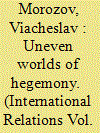| Srl | Item |
| 1 |
ID:
179759


|
|
|
|
|
| Summary/Abstract |
Since the turn of the century, memories of the Second World War are undergoing institutionalization in all states of the Baltic Sea region. Official narratives promoted by the state often lose touch with grassroots memories, which results in a growing fragmentation of the memory domain and threatens national unity. Fragmentation can only be overcome by allowing for wider margins of debate, rather than additional regulation.
|
|
|
|
|
|
|
|
|
|
|
|
|
|
|
|
| 2 |
ID:
177856


|
|
|
|
|
| Summary/Abstract |
The high level of support enjoyed by the authoritarian regime in Russia has been interpreted as evidence of the reactionary character of Russian mass consciousness. We question this view by adopting a neo-Gramscian perspective on popular culture and common sense. We view common sense as protean, combining incongruous beliefs and ideological elements. Our study of Russian women’s fiction finds that contrary to the canons of the genre, Russian authors often display their ideological preferences openly. These can be either pro-government or oppositional, which, given the wide appeal of this literature, suggests that Russian mass common sense is politically diverse.
|
|
|
|
|
|
|
|
|
|
|
|
|
|
|
|
| 3 |
ID:
184048


|
|
|
|
|
| Summary/Abstract |
The neo-Marxist literature on uneven and combined development has made significant progress towards a comprehensive theory of the international. Its point of departure is societal multiplicity as a fundamental condition of the international. This article identifies an important lacuna in the ontology of multiplicity: there is no discussion of what constitutes a ‘society’, or the basic entity capable of entering a relationship with other entities. Existing solutions, including those relying on relational sociology, gravitate towards ontological individualism. Building on poststructuralist neo-Gramscian theories, I propose to ground the conceptualisation of ‘society’ in the notion of hegemony. This implies a discursive ontology, which attributes the inside/outside dynamic to hegemonic formations rather than states or societies. Coupled with the understanding of hegemony as a scalar phenomenon, this ontology can account for the primacy of the state in modern times, while also enabling a research focus on other types of collectivities.
|
|
|
|
|
|
|
|
|
|
|
|
|
|
|
|